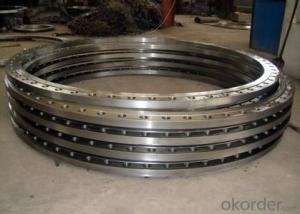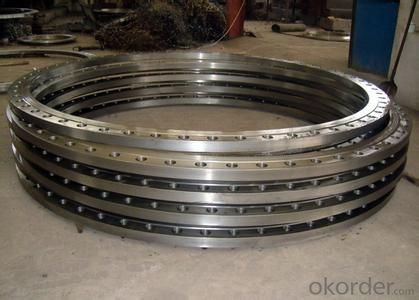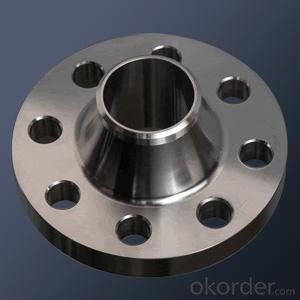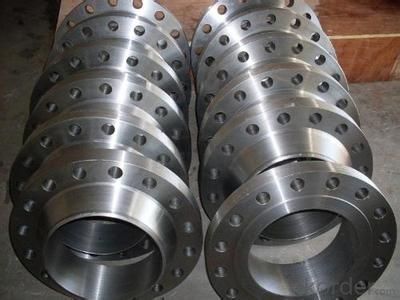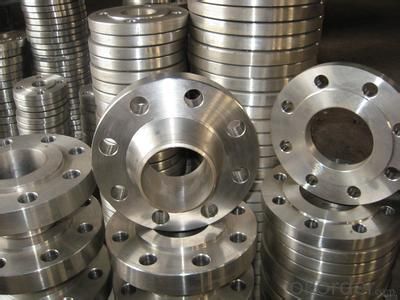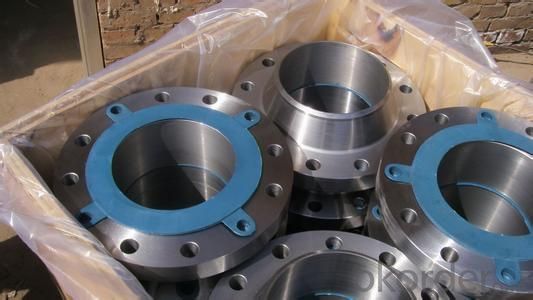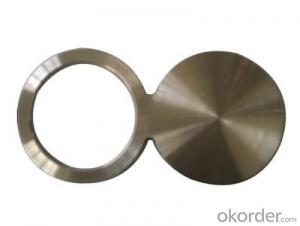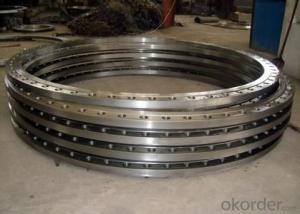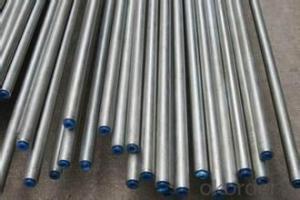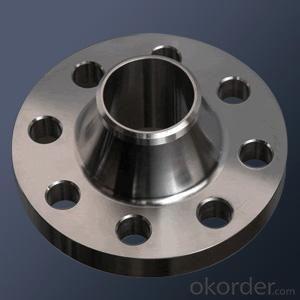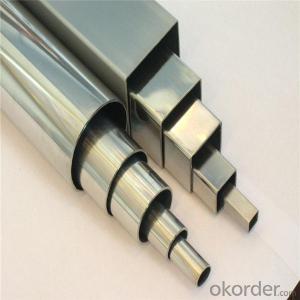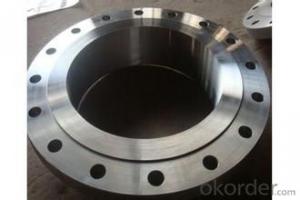STAINLESS STEEL PIPE FORGED FLANGES 304 304L 316 316L ANSI B16.5
- Loading Port:
- Tianjin
- Payment Terms:
- TT OR LC
- Min Order Qty:
- 1 pc
- Supply Capability:
- 10000 pc/month
OKorder Service Pledge
OKorder Financial Service
You Might Also Like
Package Of Stainless Steel Flange:
PACKED IN PLYWOOD CASES OR PALLETS
Painting Of Stainless Steel Flange:
ANTI-RUST OIL
Marking Of Stainless Steel Flange:
REFER TO MARKING DOCUMENT or AS PER CUSTOMER REQUEST
Shipping Marks Of Stainless Steel Flange:
EACH WOODEN BOX TWO PLASTIC SHIPPING MARKS
Specification Of Stainless Steel Flange:
Carbon Steel Flange Slip On Flange, Plate Flange, Blind Flange, Welding Neck Flange, Socket Welded Flange, Thread Flange, Lap Joint Flange, Long Welding Neck Flange
Size : 1/2"-48"
Wall Thickness.: SCH10-SCH160, SGP , XS, XXS, DIN ,STD
| Name | Stainless Steel Flange |
| Size | 1/2" - 48" |
| Face | RF, FF, RTJ |
| Wall thickness | Sch5-Sch160 XXS,STD,XS, SGP |
| Standard | ASME B16.5, B16.47, BS4504, JIS B2220, API 6A, 11Detc. |
| We can also produce according to drawing and standards provided by customers. | |
| Material | 304, 304L, 316, 316L, 304/304L, 316/316L, EN1.4301, EN1.4404 etc. |
| Packaging | Wooden Cases, wooden pallet , or carton box , or nylog bag and then in wooden cases |
| Surface Treatment | Anti-rust Oil |
| Delivery Time | 20-30 days, after received advance payment. |
| Quality | 100% Heat Treatment, No Welding repair |
| Others | 1.Special design available according to your drawing. |
| 2.anti-corrosion and high-temperature resistant with black painting | |
| 3. All the production process are made under the ISO9001:2000 strictly. | |
| 4. A conformity rate of ex-factory inspection of products. | |
| 5. we have export right , offering FOB , CNF CIF price |
STANDARD & MATERIAL GRADE
STAMDARD Of Stainless Steel Flange
<table style="WIDTH: 838px" cellspaci
- Q: Can steel pipes be used for the construction of high-rise buildings?
- Yes, steel pipes can be used for the construction of high-rise buildings. Steel pipes offer several advantages such as high strength, durability, and resistance to fire and corrosion. They can be used for various structural elements including columns, beams, and bracing systems, providing a reliable and cost-effective solution for constructing tall buildings.
- Q: How are steel pipes used in the automotive industry?
- Steel pipes are commonly used in the automotive industry for various applications such as exhaust systems, fuel lines, and structural components. These pipes provide durability, resistance to corrosion, and high strength, making them ideal for transporting gases, fluids, and supporting the vehicle's structure.
- Q: How do you connect steel pipes together?
- Various industries commonly employ several methods to connect steel pipes together. One frequently utilized technique is welding, which involves the heating of the steel pipe ends and their subsequent joining using a welding rod or wire. This method results in a robust and enduring connection that can withstand high pressures and temperatures. Threading, another method, entails cutting threads into the ends of the steel pipes. These threaded ends can then be screwed together using pipe fittings such as couplings or unions. Threading is particularly advantageous for smaller diameter pipes as it allows for easy disassembly and reassembly. Flanges also serve as a means to connect steel pipes. These flat, circular discs with holes can be bolted together, providing a secure connection. Flanges are especially suitable for large diameter pipes or those that require frequent disconnection for maintenance or repairs. Pipe fittings, such as couplings, tees, elbows, or reducers, can also be employed for connecting steel pipes. These fittings, typically composed of steel or other materials, are designed for welding, threading, or utilizing other connection methods like grooving or compression. It is important to consider various factors, such as pipe size, application, required strength, and adherence to industry standards or codes, when selecting the appropriate method for joining steel pipes. Consulting with a qualified professional or referring to industry-specific guidelines is essential in making this decision.
- Q: What is the purpose of pipe flanges in steel pipes?
- The purpose of pipe flanges in steel pipes is to provide a secure and leak-proof connection between two pipes or to other equipment, such as valves or pumps. Flanges allow for easy assembly and disassembly of pipe sections, as well as providing a means for maintenance and repairs. Additionally, they provide a stronger connection, ensuring the integrity and stability of the pipeline system.
- Q: What is the difference between hot-finished and cold-finished steel pipes?
- Hot-finished and cold-finished steel pipes are distinguished by their manufacturing processes, resulting in different characteristics and uses. Hot-finished steel pipes are manufactured by heating a solid steel billet to a high temperature and then piercing it to create a hollow tube. This process is known as hot rolling. The hot rolling process ensures that the steel is malleable and can be easily shaped into the desired form. Hot-finished steel pipes have a rough surface and more rounded edges. They are typically larger in diameter and have thicker walls. These pipes are commonly used in applications that require high strength and resistance to pressure, such as in the oil and gas industry, structural projects, and heavy machinery. In contrast, cold-finished steel pipes are made through a process called cold drawing. This involves pulling the hot-finished steel pipe through a die at room temperature to reduce its diameter and achieve the desired shape. The cold drawing process provides a more precise and smoother finish to the steel pipes. Cold-finished steel pipes have a smoother surface and sharper edges compared to hot-finished pipes. They are generally smaller in diameter and have thinner walls. Cold-finished steel pipes are commonly used in applications that require precise dimensions, such as automotive parts, construction components, and machinery manufacturing. Overall, the main difference between hot-finished and cold-finished steel pipes lies in their manufacturing processes, resulting in variations in surface finish, dimensions, and applications. Hot-finished pipes are suitable for high-strength and pressure-resistant applications, while cold-finished pipes are ideal for precise dimensions and smooth surface requirements.
- Q: The plastic pipe and steel pipe difference
- In the plastic coated galvanized steel pipe inside the plastic coated manufacturing method. The thickness of the internal plastic is thin, which is equal to a plastic skin.
- Q: Can the KBG25 steel tube hold 4 six types of cables?
- Over five types of cables, the outer cross section is about 24 square millimeters, over six types of network cable for the outer cross section of about 35 square millimeters, so 35*4/490=28.57%, far more than 20%. Therefore, according to the norm, only 3 super six categories can be worn. If the distance is short and the joint is not enough, it can be laid like this, but it does not conform to the construction standard
- Q: How are steel pipes used in the manufacturing of telecommunications infrastructure?
- Steel pipes are commonly used in the manufacturing of telecommunications infrastructure for various purposes. They are primarily utilized for the installation of underground or overhead fiber optic cables and other telecommunication lines. Steel pipes provide durability, strength, and protection to the cables against external factors such as weather, vandalism, and other potential damages. They also offer the necessary support and stability for the installation of antennas, towers, and other equipment used in telecommunications networks. Additionally, steel pipes are used for the construction of conduits and ducts that house and protect the cables within a telecommunications system.
- Q: How seamless steel tube is formed?
- Hot drawing or cold drawing. The so-called cold is the billet from the thick wall tube is not heated, oil lubrication, with a steel sleeve inside, gradually elongated. Hot drawing is to make the billet tube red, do such work, generally thick wall applicable.
- Q: What is the fire rating of steel pipes?
- Several factors determine the fire rating of steel pipes. Steel possesses inherent fire resistance due to its high melting point and low thermal conductivity. However, the fire rating of steel pipes can be further improved by employing fire-resistant coatings or insulation materials. These additional measures can offer different levels of fire protection, typically quantified by how long the pipes can retain their structural integrity during a fire situation. The precise fire rating of steel pipes may differ depending on the thickness and type of coating or insulation employed. To ascertain the appropriate fire rating requirements for specific applications, it is crucial to refer to industry standards, such as those established by organizations like the National Fire Protection Association (NFPA), or consult with fire safety professionals.
Send your message to us
STAINLESS STEEL PIPE FORGED FLANGES 304 304L 316 316L ANSI B16.5
- Loading Port:
- Tianjin
- Payment Terms:
- TT OR LC
- Min Order Qty:
- 1 pc
- Supply Capability:
- 10000 pc/month
OKorder Service Pledge
OKorder Financial Service
Similar products
Hot products
Hot Searches
Related keywords
